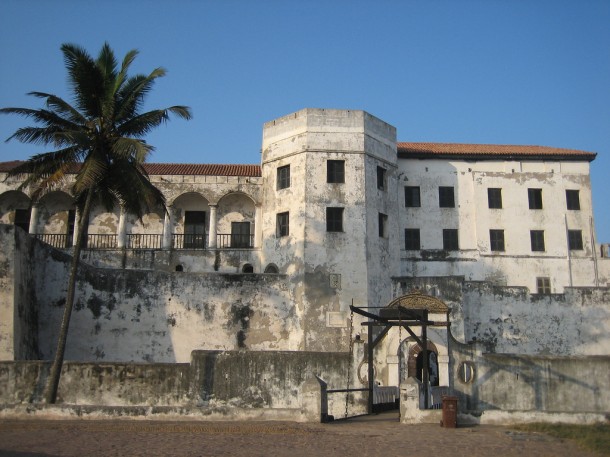ELMINA, GHANA. The tour guide warns all to careful when entering into the dark dungeon, and people file in, some tripping, down the narrow steps. They are hit by a distinct stench – the stench that still permeates over 500 years after the opening of Elmina Castle, the stench of death and decay.
Elmina Castle, located in Ghana’s Central Region, is among the country’s most popular tourist locations, attracting visitors from around the world each day.
The castle was built by the Portuguese in 1482 as a trade center for ivory, gold, spices, and other goods, before serving in the Transatlantic Slave Trade under the Dutch in 1637. The Ghanaian government gained control over Elmina Castle in 1957 when the British granted them their independence. Since then, Elmina Castle has become a national museum, and is labeled as a World Heritage Monument by UNESCO. Today, Elmina prospers as a tourist location and fishing village.
Elmina Castle stands atop an expansive green hill, surrounded by street vendors selling fish, beaded gowns, and wooden statues. The peeling white painted castle overlooks the violent waves of Gulf of Guinea and the Atlantic Ocean beyond, where ships full with sick Africans and European colonialists once sailed.
Today, tourists explore the castle’s museum, located in what was once a Portuguese church, before being led into the castle by tour guide, who pauses throughout to explain different rooms and fixtures. Some stops include the governor’s quarters led to by a staircase, where African women were humiliated and raped; dungeons where up to 200 people slept at a time, chained and dying beside one another; and the top of the castle, where cannons shoot out to the beauty beyond the brick cells.
By the 1700s, 300,000 Africans left their final holding cell, and passed through Elmina’s “Door of No Return,” and boarded ships to the Americas each year.
Linda Ofeibea Dedo Lawer, 23 of Cape Coast, is proud to have recently started working at Elmina Castle in June 2013 after completing her degree in Social Science and Education at The University of Cape Coast. “It’s just opening up my mind. I’m learning about my history and get to meet people from all over the world,” she said.
Justice Adu-Tieku, 24 of Cape Coast,recommends others to visit Elmina Castle, recalling his own experience. “It was a sad moment when I went there. I felt very bad to be a black man. But even though it’s very sad, it’s a nice experience,” he said.
According to tour guide Ato Ashun, 38 of Elmina, tourists are like Adu-Tiekuare uncommon, and most visitors come from outside of Ghana, estimating that 75% of Elmina residents haven’t toured the castle. And yet, Ashun knows he is making a difference. “Until this type of tourism came in, issues for slavery didn’t come about,” he said.
At the end of the tour Ashun offers advice to visitors – “Learn from mistakes of the past. You cannot undo the past, but you can offer the future. Never again.”

